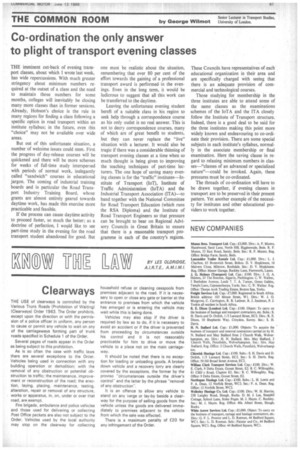Co-ordination the only answer to plight of transport evening classes
Page 99

If you've noticed an error in this article please click here to report it so we can fix it.
THE imminent cut-back of evening transport classes, about which I wrote last week. has wide repercussions. With much greater stringency about minimum numbers required at the outset of a class and the need to maintain those numbers for some months, colleges will inevitably be closing many more classes than in former sessions. Already, Hobson's choice is the rule in many regions for finding a class following a specific option in road transport within an institute syllabus; in the future, even this "choice" may not be available over wide areas.
But out of this unfortunate situation, a number of welcome issues could stem. First the progress of day-release courses will be quickened and there will be more schemes for weeks of full-time study interspersed with periods of normal work, inelegantly called "sandwich" courses in educational jargon. The coming of industrial training boards and in particular the Road Transport Industry Training Board, whose grants are almost entirely geared towards daytime work, has made this exercise more practicable and feasible.
If the process can cause daytime activity to proceed faster, so much the better; as a doctrine of perfection, I would like to see part-time study in the evening for the road transport student abandoned for good. But one must be realistic about the situation, remembering that over 80 per cent of the effort towards the gaining of a professional transport award is performed in the evenings. Even in the long term, it would be ludicrous to suggest that all this work can be transferred to the daytime.
Leaving the unfortunate evening student bereft of a suitable class in his region to seek help through a correspondence course as his only outlet is no real answer. This is not to decry correspondence courses, many of which are of great benefit to students, but they can never replace the "live" situation with a lecturer. It would also be tragic if there was a considerable thinning of transport evening classes at a time when so much thought is being given to improving the teaching techniques of part-time lecturers. The one hope of saving many evening classes is for the "traffic" institutes—Institute of Transport (loT), Institute of Traffic Administration (loTA) and the Industrial Transport Association (ITA)—to band together with the National Committee for Road Transport Education (which runs the RSA Diploma) and the Institute of Road Transport Engineers so that pressure can be brought to bear on Regional Advisory Councils in Great Britain to ensure that there is a reasonable transport programme in each of the country's regions. These Councils have representatives of each educational organization in their area and are specifically charged with seeing that there is an adequate provision of commercial and technological courses.
Those studying for membership in the three institutes are able to attend some of the same classes as the examinations schemes of the loTA and the ITA closely follow the Institute of Transport structure. Indeed, there is a good deal to be said for the three institutes making this point more widely known and endeavouring to co-ordinate their provision. There are some special subjects in each institute's syllabus, normally in the associate membership or final examination. Here the saving clause in regard to relaxing minimum numbers in classes—"classes of an advanced or specialized nature"—could be invoked. Again, these pressures must be co-ordinated.
The threads of co-ordination will have to be drawn together, if evening classes in transport are to be preserved in their present pattern. Yet another example of the necessity for institutes and other educational providers to work together.
























































































































































